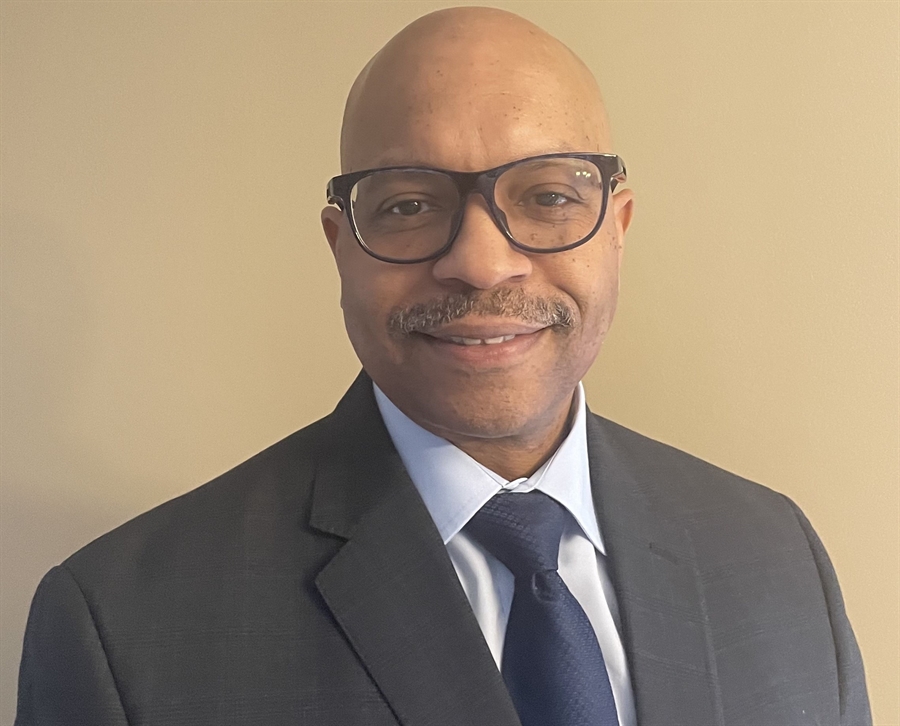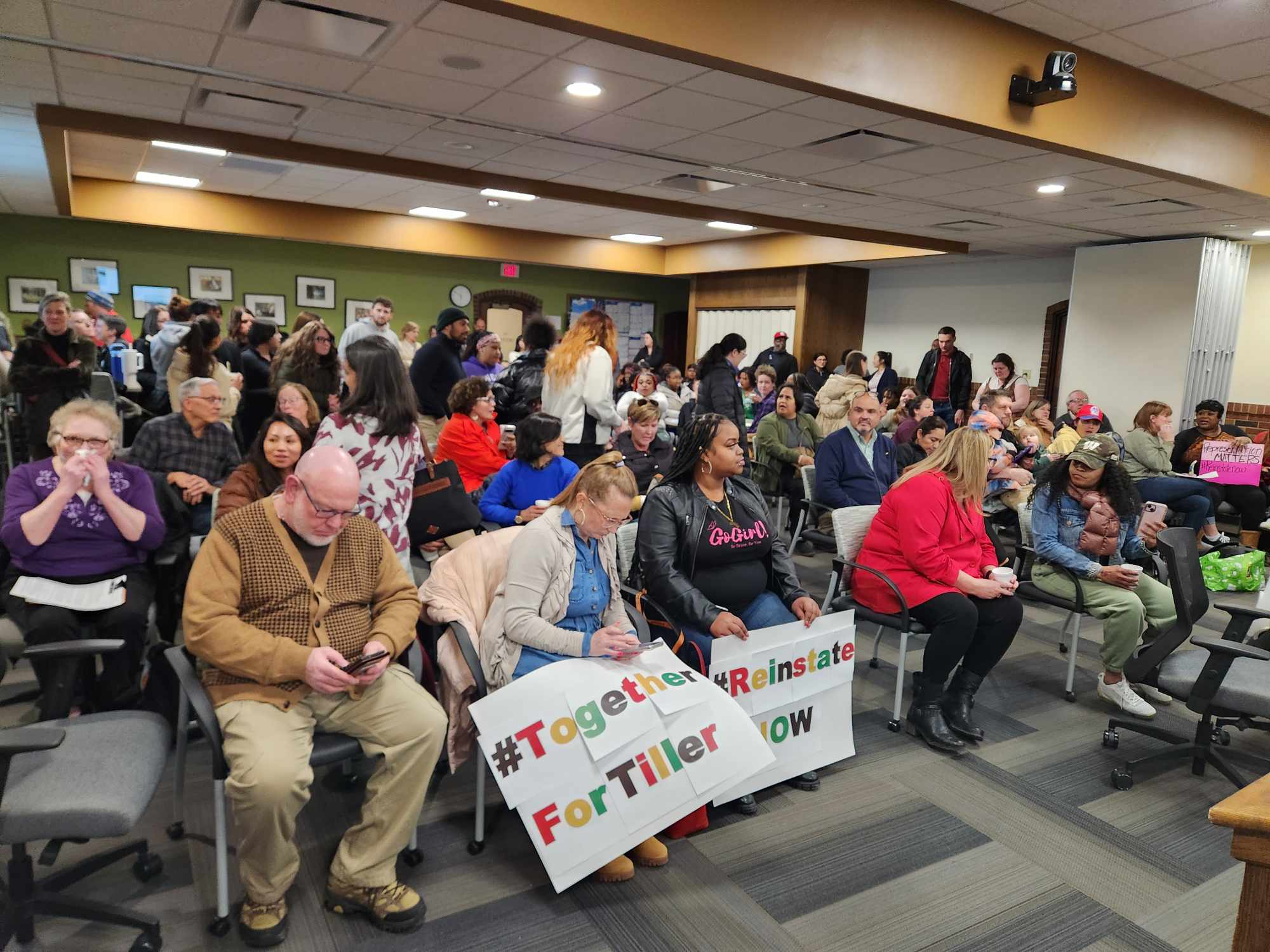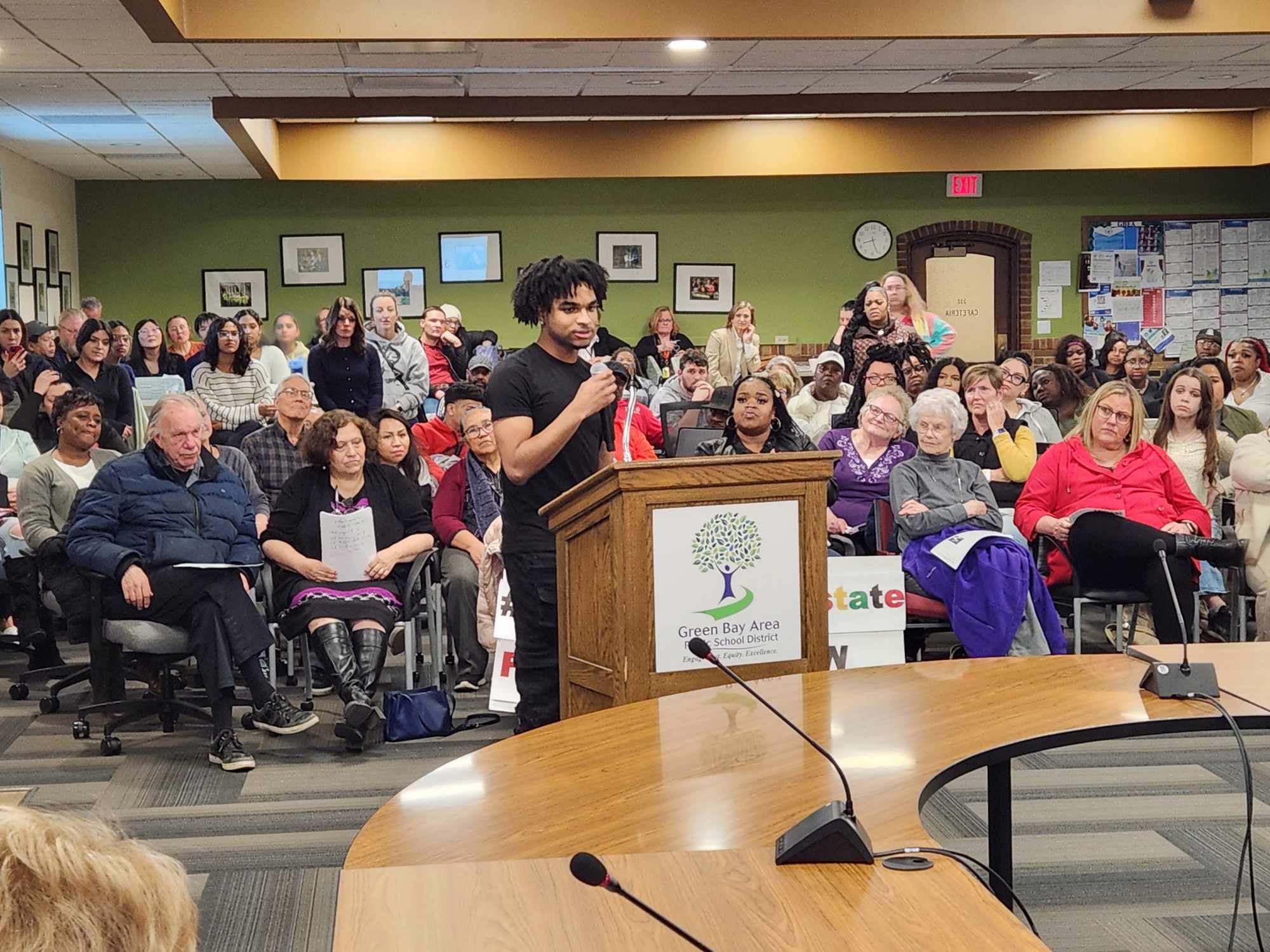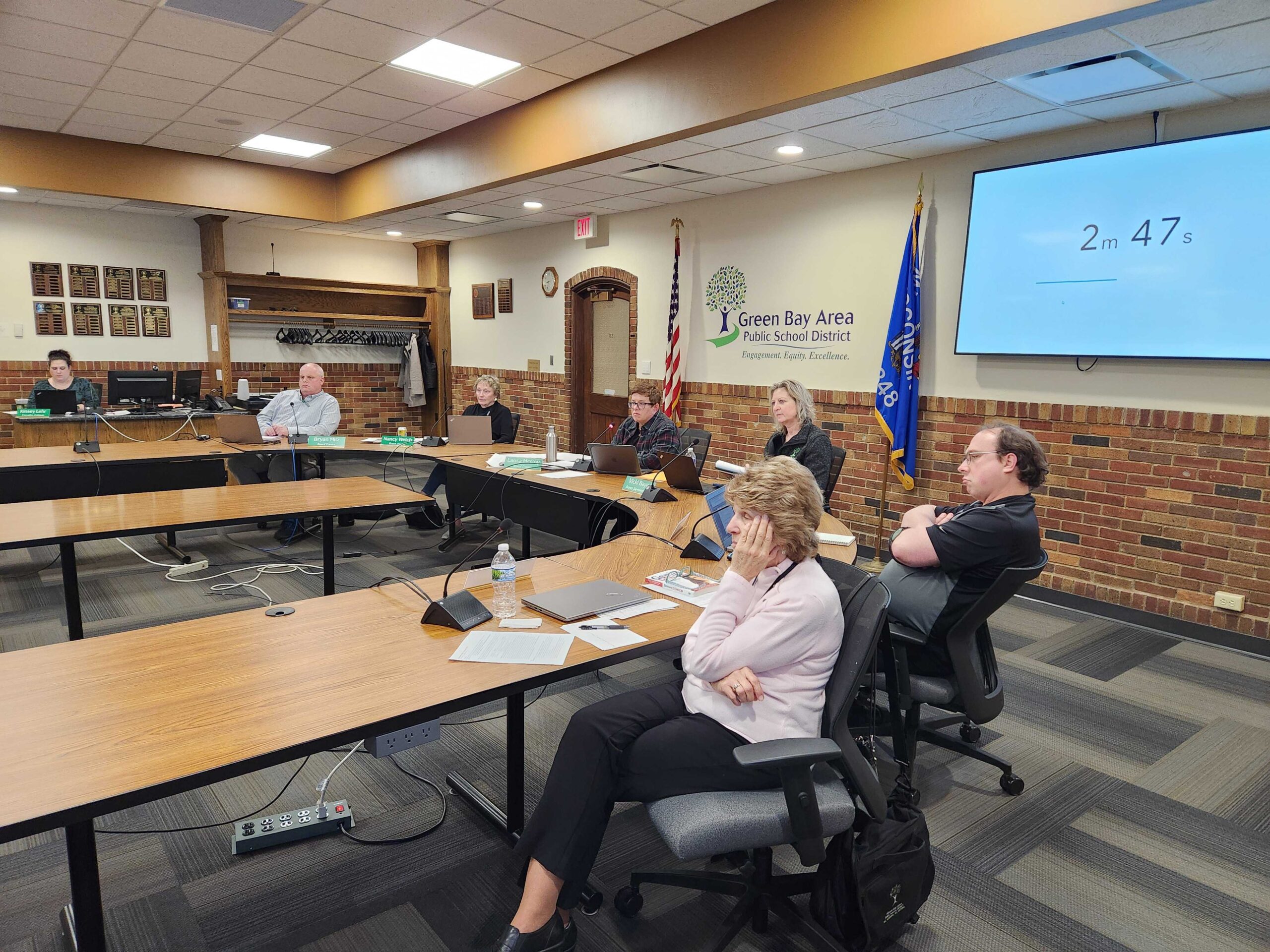Green Bay community members are calling on the school board to reinstate its former superintendent, the first Black leader in the school district’s history.
More than 50 people attended the Green Bay Area Public School District’s school board meeting Monday night to show support for former Superintendent Claude Tiller.
Tiller resigned earlier this month, ending a district investigation into comments he made on an Atlanta radio program. Last week, the district released the video of Tiller’s interview, which included some controversial off-air conversations between the former superintendent and a radio host. Those off-air comments initially came to light when the full interview was released on social media.
News with a little more humanity
WPR’s “Wisconsin Today” newsletter keeps you connected to the state you love without feeling overwhelmed. No paywall. No agenda. No corporate filter.
Monday night’s meeting included roughly three hours of public comment. The overwhelming majority of people who addressed the board asked that Tiller be reinstated.
Those who spoke to the board Monday included community leaders of color from local nonprofits, current Green Bay students, former students and concerned parents. They said Tiller’s comments during the interview were taken out of context, and were not grounds for losing his job.
In a joint statement before the meeting, the school board said it received concerns from community members after the interview aired. The board also said that Tiller was represented by legal counsel throughout the investigation process. They said Tiller voluntarily submitted his resignation, which was unanimously approved after hours of deliberation.
“We understand that this is not what some members of the community want to hear,” the board stated. “That does not mean we have disregarded concerns regarding equity and equality and the need for greater understanding and inclusion among all stakeholders.”
In a statement Tuesday, Tiller said he and his family watched the school board meeting, saying the outpouring of support “brought tears to our eyes.”
“I have come to realize that the sacred trust the Green Bay community has placed in me has shown how this is much bigger than myself,” he said. “Although out of my control, I want to provide an answer to the pressing question so many continue to ask, by publicly expressing my willingness to engage in conversations regarding the possibility of my return.”
Monday’s board meeting came just days after board member Laura Laitinen-Warren resigned. In her resignation letter, Laitinen-Warren said she wanted to reallocate her time and energy to areas where she can have a more direct and impactful role in effecting positive change in the community.
One of the organizers who called on the board to reinstate Tiller is Robin Scott, executive director and founder of We All Rise: African American Resource Center in Green Bay.
“Not one of you has stood behind us and listened to the impact, and the hurt that y’all have riveted through our community,” Scott told the school board. “It is non-negotiable for you all to go back into your closed session, and to think about the fact that you all were supposed to stand behind Claude Tiller and have his back.”
Those who addressed the board also said Tiller cared about improving the district for all students, and boosting educational outcomes for students of color, who make up more than 60 percent of the district’s student body.
Roughly 90 percent of Green Bay’s teachers are white. Last school year, Wisconsin had the worst achievement gap between Black and white students in the country. According to the New York Times, research shows students perform better academically when teachers share their race or gender.
On Saturday, community members held a panel discussion to discuss what they felt went wrong in the school board’s process and to organize efforts to reinstate Tiller. A petition to reinstate him has been circulated online, collecting more than 1,000 signatures.
Green Bay resident Stephanie Ortiz, the mother of a district student, started the petition. Ortiz told WPR she believes the district needs to have tough conversations about race and the role systemic racism plays in educational outcomes.
“We have to have these courageous conversations about race and racism because it is the root cause of why these disparities are existing in the first place,” she said. “From my perspective, when you watch the entire video, it’s really clear that Dr. Tiller has tried to call the community into having courageous conversations with the hope being that we are able to serve students in the way that we envision.”

What did Tiller say in the interview?
Tiller’s interview with an Atlanta-based radio station was part of a planned multi-state tour to recruit teachers from historically Black colleges and universities.
In the roughly two-hour video released by the school district, he spoke about the need for the district’s teaching staff to better represent its diverse student body. But he said teachers of color often struggle to find a sense of community in Green Bay, which is something he wanted to change.
“Shame on us for not embracing them and formulating a community,” Tiller said.
Tiller said he worried that if he didn’t succeed at his job it would close doors for more Black leaders in the community. He said Green Bay’s mindset around race is “almost like stepping back in time.”
“I’m here to bring voice to the voiceless,” he said. “I have had literally people come up to me and start crying and say, ‘please don’t leave us.’”
He also spoke about some of the interactions he had with white staff members in the district and the cultural differences he’s experienced. He said some confused his passion with anger, and that he was working to help bridge those divides.
In one of the off-air statements that led to the board investigation, Tiller called a staff member a “witch,” and spelled out b****, to describe how that individual treated an employee of color. Tiller also criticized the local business community in his off-air comments for his belief that they were not doing enough to support students of color.
In a statement the day of his resignation, Tiller said his comments, both on and off air, came from his personal and professional experience as an educational leader of color.
“It was disheartening to learn that select comments in my two-hour long interview were interpreted in a manner that inadvertently caused offense with some in our school community,” he said. “It’s important to emphasize that my comments were specifically directed toward the broader systemic issues within public education that contribute to ongoing challenges.”

For many, Tiller’s resignation is a reminder of racial inequities
Scott with the African American Resource Center watched the video released by the school district. She told WPR she believes it reflected candid conversations between two Black individuals.
“It seemed like a very normal conversation, a very healthy conversation between two education professionals that I feel like, in both regards, should be people that I would hope that our school district would have looked up to,” she said.
Rosita Jackson-Enos, a Black woman who moved to Green Bay in the 1980s, said Tiller’s resignation is a reminder that the community still has a long way to go to address long-standing issues of racism.
She told WPR her children had never heard the N-word before the family came to Green Bay. Now she has grandchildren in the district. Jackson-Enos also said it’s hard for Black children to build a sense of trust with white staff members.
“Imagine that you couldn’t take for granted that anybody who didn’t look like you wasn’t going to hurt you, wasn’t going to say something or call you names,” she said. “You’re constantly on defense. You’re hyper vigilant. That’s an impossible state for a human being to maintain.”
Green Bay Preble High School senior Hashanti Perry told the school board she’s never felt welcome in the community as a young Black woman. She plans to leave after graduation to attend a historically Black college.
“I have two younger siblings that are, unfortunately, going to have to go through the things that I have went through,” she said.
Perry said Tiller made her feel like someone cared. She said it was empowering to see another Black person in a leadership position.
“Y’all need to reinstate him because I’m not just speaking for myself. I’m speaking for my siblings,” she said. “I’m grown now. I’m leaving. This is their future. They don’t deserve to go through the stuff that I went through. They deserve the world but I can’t get them that.”
Scott said she believes it will be difficult for the district to rebuild a sense of trust if Tiller isn’t reinstated. She said the board’s handling of the situation was an example of “white people who get to choose a Black man’s fate.”
“They have set us back the 147 years it took to hire their first Black superintendent,” Scott said. “There’s gonna have to be so many relationships that are rebuilt. But something that’s really hard to get back, is when you have broken trust.”
Wisconsin Public Radio, © Copyright 2025, Board of Regents of the University of Wisconsin System and Wisconsin Educational Communications Board.







